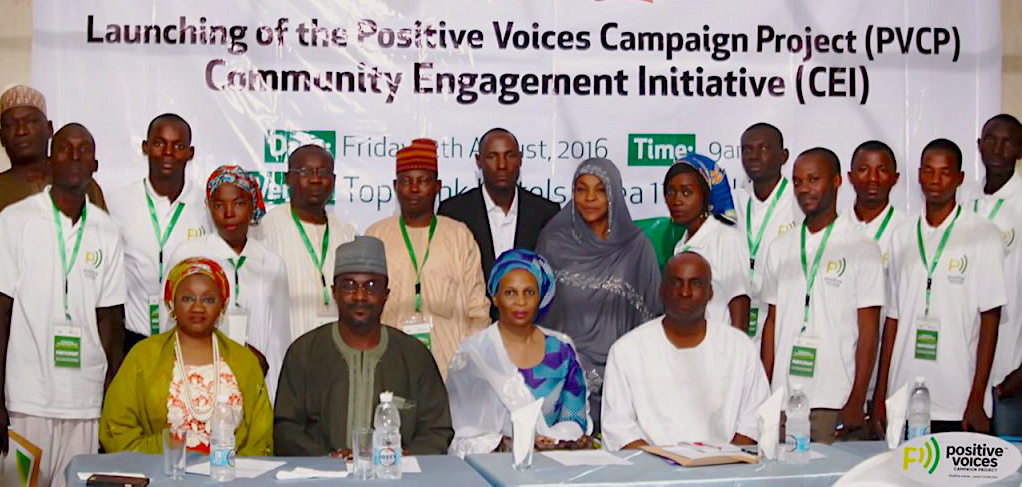
This article is published as part of AP’s work in support of the Youth, Peace and Security agenda, as defined by UN Security Council Resolution 2250 (2015). To learn more about our work and read the other articles published, please click here.
In the last decade, Nigeria has been battling religious intolerance, violent extremism and youth radicalization. This has been largely fueled by the rapidly diffused messages on ethno-religious identities, which have interacted with political and socio-economic grievances across the country. The situation has increased the fragility and vulnerability of young people, who are increasingly gravitating towards the messages of radical and violent individuals or groups.
It is against this backdrop that MicroDevelopment Consulting designed and launched the Positive Voices Campaign Project, in 2015. In conjunction with the Office of the National Security Adviser and the Nigeria Stability and Reconciliation Programme (NSRP), the project wanted to use a different approach to engaging young people and pulling them away from violence.
A 2012 study by the NSRP had in fact found that youth radicalization was becoming a rising problem, in particular in the country’s North-East, where Boko Haram had been a conflict feature for some time. By 2015, violent extremism had become a security concern for 72% of Nigerians, according to the Pew Research Center. Indeed, since 2009, Boko Haram has carried out a regular string of attacks against security forces and communities. In August 2011, 23 people were killed by a car bombing outside the United Nations headquarters, while 276 schoolgirls were kidnapped in April 2014. Furthermore, Nigeria’s conflict management architecture and early warning systems relied on a complex and overlapping set of agencies that were poorly coordinated, lacked strategic direction, were not inclusive or accountable and did not enable cooperation between state and non-state actors. As a result, government agencies and security forces often neglected preventive measures, and this led to responses that were often heavy-minded and failed to identify and tackle the underlying causes of violent extremism across the country.
The Positive Voices Campaign Project, which was implemented in six states across Nigeria, deployed three inter-related areas of work:
- Build the capacity of youth leaders so they could become positive role models (so-called Positive Voices, or PVs) and counter radicalized propaganda and messages in their communities;
- Support the design of Community Engagement Initiatives (CEIs) as vehicles for facilitating tolerance and peacebuilding; and
- Targeted advocacy to youth and communities to counter negative narratives through co-curricular activities and strategic communication.
Prior to the roll out of the project, MicroDevelopment Consulting conducted a baseline study and the strongest theme to emerge from the study was that lack of opportunities for youth was putting them at risk of radicalization. The main examples included the lack of vocational skills development centers, and sports or recreational facilities. Survey findings also revealed a high degree of parental neglect, and detachment or dropout from formal education in cases of radicalized youth.
The Positive Voices project was therefore designed to complement the predominant ‘hard’ approach to countering violent extremism. The expected outcome was increased resilience to ‘pull’ factors and negative narratives that draw youth to violent extremism. The concept was based on the premise that selected, trained and mentored role models (the PVs) would implement initiatives that served as veritable channels for positive messages, and provide alternative narratives and rallying points for vulnerable young people. The project was to serve as a launching pad for peacebuilding and value-driven education. It would, moreover, complement what others actors were already doing: the Office of the National Security Adviser had rolled out a series of interventions to tackle the ‘push’ factors that drove violent extremism, but there was a dire need to introduce interventions to tackle the ‘pull’ factors to serve as a parallel strategy and produce a multidimensional response to extremist messaging.
In the end, the Positive Voices project had implemented 17 CEIs, providing a platform for the dissemination of counter-narratives and positive messages. The efforts also built social cohesion and resilience among young people. Through CEIs and the broader community sensitization campaign, the project directly reached a total of 4,675 people, (62% men and 38% women). Out of the total number, 36% were in the 15-to-19-years-old age bracket, 29% in the 20-25 bracket, and 19% in the 26-35 bracket.
Studies have revealed that the project has begun influencing youth response to divisive messages and strengthening of social and ethnic ties. For instance, members of one community in Kano State, in North-West Nigeria, all agreed that a talk show initiative, which a PV role model had implemented, was successful in averting a religious crisis that had erupted there. The project also attracted the interest of the media, leading to increased broadcast and coverage of conflict and gender-sensitive activities. By April 2017, nearly ten separate episodes of programming around conflict and peacebuilding had been broadcast by the project’s media partners. PVs and partners were granted increased airtime on several radio stations to discuss emerging political and social issues that drive conflicts.
Overall, the project engendered a change in how young people responded to violent extremist messages. PV role models empowered individuals, groups and communities to take action and positively engage in peace rather than tolerating or perpetuating violence. There were clear changes in the salience of the issue of youth radicalization and increased awareness of the impact of charismatic, albeit negative, leadership role modelling. Before the project, most people were in fact not aware of how role modelling could counter the youth radicalization process, but with the work of the Positive Voices in their community, traditional leaders and politicians better understood the importance of this approach.
The Positive Voices project has demonstrated how integrating role models into local and state-level peacebuilding frameworks can be relevant to countering violent extremism and radical ideologies, because even though the entry point is perceived or actual family and social exclusion, the pull towards radicalization is heavily reliant on the ‘appeal’ factor, or emotive bond. The main channel of radicalization is through social ties and peer-to-peer interactions, rather than the media. The interaction converges around a cult figure, or role model, who influences young followers and feeds them with extremist religious narratives. The entry point is a need to belong to a support group.
In this context, young people must be seen as an effective resource for reducing the vulnerability index of fragile communities, when given the required support to facilitate learning and lead co-curricular initiatives. Community peacebuilding activities should revolve around key areas of interest for young people, and programmes to counter violent extremism should be localized and use indigenous means of communication to implement outreach and community mobilization.
Vivienne Bamgboye is the former Programme Director and Capacity Development Coordinator for the Positive Voices Campaign Project. She is now an associate consultant with MicroDevelopment Consulting in Abuja, Nigeria.































